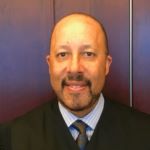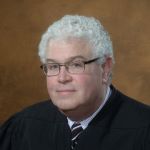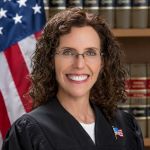<< Back
You Will Learn
Speakers


Hon. Christopher M. Alston Hon. Frank Bailey (Ret.)
U.S. Bankruptcy Court, U.S. Bankruptcy Court,
Western District of Washington, District of Massachusetts (Ret.),
Seattle, WA Boston, MA

Hon. Sandra R. Klein
U.S. Bankruptcy Court,
Central District of California,
Los Angeles, CA
The Connecticut Bar Association/CT Bar Institute is an accredited provider of New York State CLE. This program qualifies for non-transitional CLE credits.
Attorneys seeking NY CLE credit who have been admitted to the New York State Bar for two years or less must attend the live seminar for skills or ethics credit, or a fully interactive videoconference. Diversity, Inclusion and Elimination of Bias CLE credits are only available as non-transitional credits. For further information about transitional and non-transitional courses, please see the NYCourts.gov page on CLE: http://ww2.nycourts.gov/attorneys/cle/index.shtml.
Financial hardship information is available upon request.
Modern Issues of Diversity and Bankruptcy Court Practice-ECB221110-MP
Cost -
Member - $52.00
Non-Member - $105.00
Student - $30.00
Program Date - Thursday, November 10, 2022
Product ID - ECB221110-MP
CLE Credit
CT: 1.5 CLE Credits (1.5 Ethics)
CT: 1.5 CLE Credits (1.5 Ethics)
NY: 1.5 CLE Credits (1.5 D&I)
About the Program
The United States Bankruptcy Court is the least diverse bench in the federal court system and the bankruptcy bar reflects that lack of diversity in most judicial districts. This three-judge panel will Look carefully at three issues: Does the bankruptcy bench and bar reflect the diversity of the the communities that we serve? If not, what are the implications for the bankruptcy system and society more broadly? Finally, what can be done to make the bench and bar more reflective of the communities that we serve? In this interactive program Judges Frank J. Bailey (D.Mass.)(ret.), Chris Alston (W.D.WA.) and Sandra Klein (C.D.CA.) will offer observations concerning those three questions.
Racial, ethnic and gender bias has no place in the practice of law, especially in the courtroom where the judge and counsel are striving to have cases decided on their merits. The panel will provide concrete ideas on how both judges and advocates can recognize and avoid such bias. In a workshop fashion, the group will be asked to react to scenarios involving conduct toward women and diverse lawyers that reflect a lack of sensitivity to bias by the court, opposing counsel, and even co-counsel. Please come prepared to contribute your insights!
The United States Bankruptcy Court is the least diverse bench in the federal court system and the bankruptcy bar reflects that lack of diversity in most judicial districts. This three-judge panel will Look carefully at three issues: Does the bankruptcy bench and bar reflect the diversity of the the communities that we serve? If not, what are the implications for the bankruptcy system and society more broadly? Finally, what can be done to make the bench and bar more reflective of the communities that we serve? In this interactive program Judges Frank J. Bailey (D.Mass.)(ret.), Chris Alston (W.D.WA.) and Sandra Klein (C.D.CA.) will offer observations concerning those three questions.
Racial, ethnic and gender bias has no place in the practice of law, especially in the courtroom where the judge and counsel are striving to have cases decided on their merits. The panel will provide concrete ideas on how both judges and advocates can recognize and avoid such bias. In a workshop fashion, the group will be asked to react to scenarios involving conduct toward women and diverse lawyers that reflect a lack of sensitivity to bias by the court, opposing counsel, and even co-counsel. Please come prepared to contribute your insights!
Credit
Ethics and Professionalism:1.5
Description
2022 5th Annual Connecticut Bankruptcy Conference
Presented by the Commercial Law and Bankruptcy Section
You Will Learn
- How to recognize, avoid, and address racial, ethnic, and gender bias in the courtroom and in law practice
- How to avoid gender missteps when addressing the judge and counsel in court proceedings
- About the benefits of a bankruptcy bench that is reflective of the communities that they serve
Speakers


Hon. Christopher M. Alston Hon. Frank Bailey (Ret.)
U.S. Bankruptcy Court, U.S. Bankruptcy Court,
Western District of Washington, District of Massachusetts (Ret.),
Seattle, WA Boston, MA

Hon. Sandra R. Klein
U.S. Bankruptcy Court,
Central District of California,
Los Angeles, CA
The Connecticut Bar Association/CT Bar Institute is an accredited provider of New York State CLE. This program qualifies for non-transitional CLE credits.
Attorneys seeking NY CLE credit who have been admitted to the New York State Bar for two years or less must attend the live seminar for skills or ethics credit, or a fully interactive videoconference. Diversity, Inclusion and Elimination of Bias CLE credits are only available as non-transitional credits. For further information about transitional and non-transitional courses, please see the NYCourts.gov page on CLE: http://ww2.nycourts.gov/attorneys/cle/index.shtml.
Financial hardship information is available upon request.
Courses in package:
| Title | Credit Hours | |
|---|---|---|
| 1 | ||
| 2 | ||
| 3 | ||
| 4 | ||
| 5 | ||
| 6 | ||
| 7 |